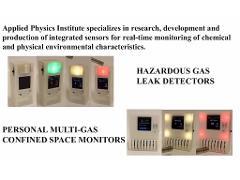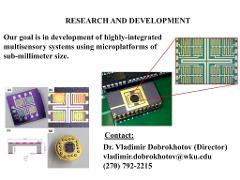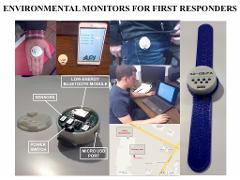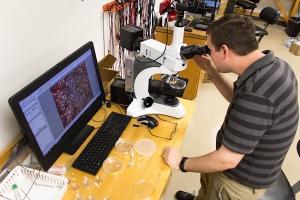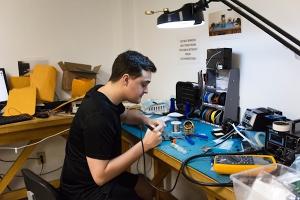Applied Physics Institute
- Dr. Vladimir Dobrokhotov, Director
- Dr. Ivan Novikov, Dr. Doug Harper, API Faculty
- Corner of Nashville Road and Campbell Lane
- 270-781-3859
- 270-781-1104
About the API
The Applied Physics Institute (API) at Western Kentucky University (WKU) is a multidisciplinary center performing research and development projects in nanoscale physics, material science, nuclear physics, and cyber physical systems. The API has about 15,000 sq. ft of laboratory and office space in the new building at the WKU Center for Research and Development. In addition, a 10,000 sq ft outdoor facility is available which is licensed for the use of radioactive materials and radiation-producing machines.
Our strengths are in detection of explosives and chemical threats (bulk and trace methods), analytical gas instruments, environmental analysis, radiation detection (active probe and passive methods), cyber defense methods, and critical infrastructure protection applications (based on existing funded projects). The API was researching homeland security issues such as chemical agent detection, explosives detection, radiological and nuclear detection long before the phrase “Homeland Security” was coined. Since its inception, API has been involved in these projects. It continues to be on the cutting edge of Homeland Security science and technology. API faculty members represent four departments of WKU: Physics, Chemistry, Engineering and Mathematics, making our center truly multidisciplinary.
MS in Homeland Security Science
Since June 2007 at Western Kentucky University, we offer a defense and security career development program that integrates research-related education and research projects with internships and employment pipeline: the Master’s Program in Homeland Security Science and Technology (HSSP). The Goal of the Master’s Program is to prepare science professionals and technology leaders for careers in Defense and Homeland Security. This specific program of study is concentrated in applications of science, technology, engineering, and mathematics (STEM) disciplines to prepare students with the skills and knowledge to detect, quantify, prevent, and address chemical, biological, radiological, nuclear, and explosive (CBRNE) threats, and cyber defense threats. The program naturally arises from defense and security oriented research carried out at Applied Physics Institute since 1994. The program produces defense and security oriented scientists and engineers. We prepare local U.S. students; including women, minorities, and war veterans.
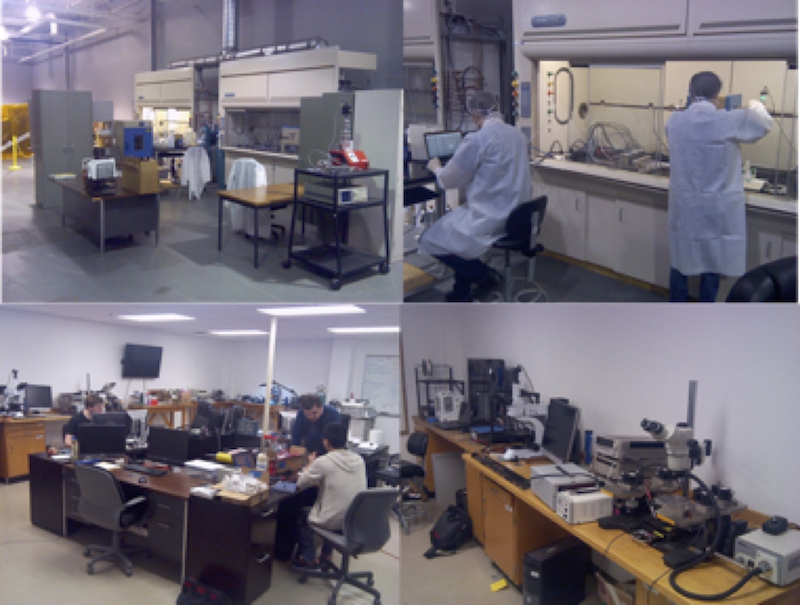
Currently, some students are in the National Guard, some students plan to transition into the DoD work. Our vision is to offer a workforce-oriented Master’s program that integrates instruction in STEM disciplines with research, defense and security tailored courses, scholarships and internships, and to establish the pipeline for transition of graduates to the workforce by providing them with employment opportunities. We promote the education and research training of current and future science and technology professionals in defense and security. Thematic basis of the program is defense and security Science and Technology. The specific research-oriented STEM program of study fosters meaningful interactions among participating students, faculty, outside scientists and Defense and Security professionals, and provides for career development opportunities, development of professional and interpersonal skills, and ability to conduct research projects in interdisciplinary environment. The program’s research and educational focus areas are closely aligned with WKU’s strategic goals to foster applied science and technology. The program combines the graduate education and research training central to the project.
Admission to the program requires a Bachelors degree in the STEM discipline. The program leads to Master of Science degree in Homeland Security S&T and requires a minimum of 31 semester hours beyond a Bachelor degree. The program's curriculum features a hands-on research component, which enables students to apply their training to real-world problems, thus coupling STEM education with practical skills requested by employers. Details about the program are available at the program’s website.
In addition, we established working relationship with the Air Force Institute of Technology (AFIT); it allows our students to take AFIT online course in the Chemical Agent Detection. We have established relationships with Electronic Warfare Associates – Government Systems, Inc. and Northrop Grumman Corp. – two defense and homeland security contractors. The program fosters meaningful interactions among participating students, faculty, outside scientists and defense and Security professionals, and provides for career development opportunities, development of professional and interpersonal skills, and ability to conduct research projects in interdisciplinary environment.
The program provides relevant educational curricula for both matriculated students and mid-career professionals. The program helps to improve the security of the nation, while preserving our values, freedoms, and economy. It supports innovative, leading-edge intra-disciplinary and inter-disciplinary research, study, and technology development, leading to practical, affordable solutions to the current and future security challenges the United States faces at home and around the world. The program is designed to stimulate, coordinate, and utilize the unique intellectual capital in the academic community to address current and future Homeland Security challenges, and educate and inspire the next generation of homeland security specialists addressing the existing gap in science professionals trained in crosscutting security applications of STEM disciplines.
A community of faculty, staff, and students engaged in better understanding the physical world.



